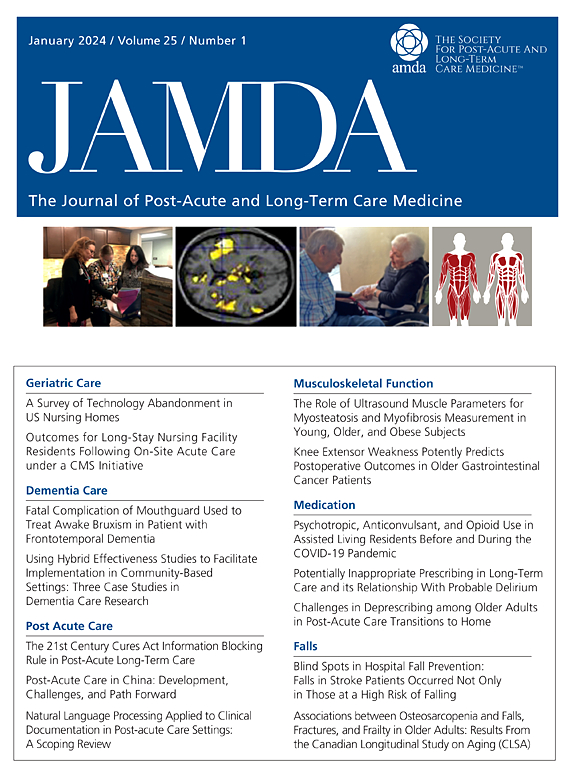强化小组活动套件对痴呆症患者福祉的影响。
IF 3.8
2区 医学
Q2 GERIATRICS & GERONTOLOGY
Journal of the American Medical Directors Association
Pub Date : 2024-10-28
DOI:10.1016/j.jamda.2024.105329
引用次数: 0
摘要
目的:痴呆症患者(PLwD)常常感到孤独和无聊。本研究探讨了在增强型小组活动包(EGAKs)的协助下开展小组活动对这一人群幸福感的影响,并比较了这一干预措施与(1)无增强型小组活动包协助的小组活动和(2)不开展小组活动的影响:研究以阶梯式分组试验的形式进行:研究对象包括以色列特拉维夫和耶路撒冷市区 6 家护理机构和 4 家为 PLwD 设立的日间老年护理机构的 123 名 PLwD:参与者在参加小组活动的同时,使用 "小组参与观察测量"(GOME)评估工具对他们的幸福感进行评估,并从中得出幸福指数。参与者参加了基线小组活动,在此期间,设施员工活动负责人在不使用 EGAK 的情况下开展活动。之后,同一位活动负责人和参与者参加了使用 EGAK 的活动。在研究过程中,一名活动负责人辞职,她的参与者不再参加小组活动,我们在他们之前参加活动的时间对他们进行了评估:结果:与未使用 EGAKs 的同一位活动负责人开展的小组活动相比,使用 EGAKs 的小组活动显著提高了参与者的幸福感(P < .001)。与基线小组活动课程(未使用 EGAKs)相比,无活动状态下的幸福感出现了非常显著的下降(P < .001):研究结果表明了 EGAKs 在改善痴呆症患者生活质量方面的潜在作用。养老院、生活辅助设施和老年人日间活动中心可以大规模使用这种相对廉价的创新方法。未来的研究应扩大 EGAK 的内容范围,以便为不同文化背景的痴呆症患者提供服务。本文章由计算机程序翻译,如有差异,请以英文原文为准。
The Impact of Enhanced Group Activity Kits (EGAKs) on Well-being of Persons With Dementia
Objectives
People living with dementia (PLwD) often feel lonely and bored. This study examined the impact of group activities on the well-being of this population when these activities were facilitated by enhanced group activity kits (EGAKs) and compared the impact of this intervention with (1) group activities not facilitated by EGAKs and (2) the absence of group activities.
Design
The study was conducted as a stepped-wedge clustered trial.
Setting and Participants
The study included 123 PLwD from 6 nursing care units and 4 senior day units for PLwD in the Tel Aviv and Jerusalem metropolitan areas of Israel.
Methods
The participants took part in group activities while their well-being was assessed using the Group Observational Measurement of Engagement (GOME) assessment tool, from which a Wellbeing Index was derived. Participants attended baseline group activities, during which a facility staff activity leader conducted activities without using EGAKs. Thereafter, the same activity leader and participants engaged in activities that used EGAKs. During the course of the study, 1 activity leader resigned, and her participants, who were no longer offered group activities, were assessed at the times during which their previous activities would have occurred.
Results
Significant improvement in well-being (P < .001) was found during group activities facilitated using EGAKs compared with group activities conducted by the same activity leaders not using EGAKs. Compared with baseline group activity sessions (without EGAKs), a no-activity state yielded a highly significant decrease in well-being (P < .001).
Conclusions and Implications
The results demonstrate the potential utility of EGAKs to improve the well-being of people living with dementia. This relatively inexpensive innovation can be made available on a large scale to nursing homes, assisted living facilities, and senior day centers. Future research should expand the range of content of EGAKs in order to serve PLwD of diverse cultural backgrounds.
求助全文
通过发布文献求助,成功后即可免费获取论文全文。
去求助
来源期刊
CiteScore
11.10
自引率
6.60%
发文量
472
审稿时长
44 days
期刊介绍:
JAMDA, the official journal of AMDA - The Society for Post-Acute and Long-Term Care Medicine, is a leading peer-reviewed publication that offers practical information and research geared towards healthcare professionals in the post-acute and long-term care fields. It is also a valuable resource for policy-makers, organizational leaders, educators, and advocates.
The journal provides essential information for various healthcare professionals such as medical directors, attending physicians, nurses, consultant pharmacists, geriatric psychiatrists, nurse practitioners, physician assistants, physical and occupational therapists, social workers, and others involved in providing, overseeing, and promoting quality

 求助内容:
求助内容: 应助结果提醒方式:
应助结果提醒方式:


